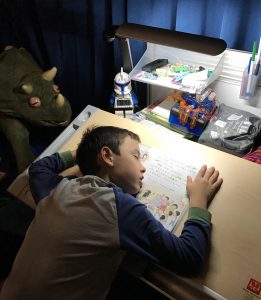
Is my child getting enough sleep?
My son always seems to be tired. He sleeps well overnight, although he usually goes to bed around 11pm, and it is very difficult for him to wake up at 6am to get ready for school. In the afternoon, I notice that he struggles to stay awake, and has difficulty concentrating on his homework. Is there something wrong with him?
Getting enough sleep is crucially important for all of us, but is even more important for growing children. Children’s bodies work hard, playing sports and doing lots of activities, and they are at a critical period for learning. It is sometimes easy to forget that children need enough sleep for their brains to function at a high enough level to concentrate on their school work.
There is a trend towards children going to bed later and later; they are also waking up earlier and earlier. Parents cite homework and tuition commitments, as well as their own long working hours and late return home as contributing factors. Children then find it hard to wake up in the morning, and struggle to concentrate in class.
So how much sleep does your child need?

The National Sleep Foundation recently published its findings and recommendations on sleep requirements at different ages throughout childhood and adolescence. These recommendations are based on a two year scientific study assessing sleep requirements across different age ranges. The study included input from paediatricians, neurologists (people who study the brain), developmental experts, sleep specialists and other health care professionals. You can read the full study on the Natonal Sleep Foundation’s website.
As you can see, a school aged child (ages between 6 and 13 years) requires an average of 9 to 11 hours of sleep per day. If your child has to wake up at 6am for school, then ideally his bedtime should be no later than 9pm to receive 9 hours of sleep.
Establishing a good bedtime routine
Once you have determined what time your child should be getting to bed, how do you go about making it happen?
1. Aim to get homework and other necessary activities out of the way earlier on in the afternoon and early evening, so that bedtime won’t be compromised. Encourage your child to develop good time management skills- set aside a certain amount of time to complete homework assignments- and stick to it!
2. Try to set a regular bedtime. Our bodies prefer routine, so establishing a regular bedtime allows our bodies to become accustomed to relaxing towards bed at a specific time. Setting a regular waking up time is also a good idea.
3. Keep to the same routine over the weekend too! Studies show that staying up late over the weekend, coupled with allowing your child to have a lie in can have the same effect on his body as jet-lag. This will make it even harder for him to get out of bed when the new school week starts.
4. Make sure your child is getting enough exercise. Aim for at least one hour a day of moderate intensity exercise. Examples include swimming, bike riding or running, or engaging in sports such as football or tennis. Although moderate to high intensity sport is not a great idea in the hour just before bedtime, you can encourage some stretching or low impact exercises just before bed to aid in relaxation.
5. Ensure dinner time is not too close to bedtime. Try to give the body at least a couple of hours to digest the last meal of the day before bedtime,
6. Set a pattern of calming activities in the lead up to bedtime. A good example for a school aged child would be: dinner, followed by a shower or bath, followed by some time reading a book for relaxation and then adhering to a strict “lights out” time.
Practising good sleep hygiene
Help your child to avoid the following habits that can lead to poor sleep quality:
1. Avoid blue light emitting devices in the one hour period just before bed. These include television, tablets and mobile phones, as well as other electronic devices. Blue light emitting devices are known to stimulate the brain and make it harder for children to calm down before bedtime.
2. Avoid sugary drinks and desserts: too much sugar can lead to hyperactivity, again making it difficult to get to sleep.
3. Avoid caffeine in drinks such as cola, tea (including green tea and iced lemon tea) and coffee. Caffeine is a powerful stimulant that can increase wakefulness. Check the labels of other soft drinks that may also contain caffeine.
4. Don’t stress! If your child is worried about the following day, or they cannot relax, encourage them to make lists. Lists help us to organise our thoughts, and clearly define problems, thereby reducing anxiety. Using breathing techniques such as taking five deep breaths in and out also help to manage stress.
Other mindfulness techniques to relieve stress can include:
- listening to calming music or sounds
- gazing on the stars or a flickering candle
- concentrating on a special sensation such as the breeze on your face from an open window.
If you enjoyed reading this article, do subscribe so you won’t miss any of the upcoming ones. Enter your email address in the top right-hand corner and hit the Subscribe button.



Leave A Reply